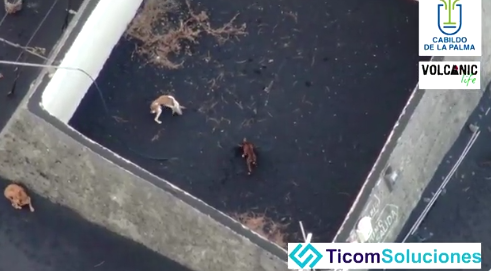La Palma volcano: Rescuers to try and save trapped dogs using drone with big net
‘They’ve been eating very little for weeks,’ drone company says

Your support helps us to tell the story
From reproductive rights to climate change to Big Tech, The Independent is on the ground when the story is developing. Whether it's investigating the financials of Elon Musk's pro-Trump PAC or producing our latest documentary, 'The A Word', which shines a light on the American women fighting for reproductive rights, we know how important it is to parse out the facts from the messaging.
At such a critical moment in US history, we need reporters on the ground. Your donation allows us to keep sending journalists to speak to both sides of the story.
The Independent is trusted by Americans across the entire political spectrum. And unlike many other quality news outlets, we choose not to lock Americans out of our reporting and analysis with paywalls. We believe quality journalism should be available to everyone, paid for by those who can afford it.
Your support makes all the difference.A drone operator has received permission to rescue three dogs trapped by a volcano eruption in the Spanish Canary Island of La Palma.
Aerocamaras, the Spanish drone company, announced on Monday that it has received permission from authorities to carry out the rescue operation. Rescuers will use a remote-controlled net to airlift the dogs.
“Our pilots are conducting tests together with the emergency teams at this moment,” the company said on Tuesday. “Due to the complexity of the operation, we need calm and concentration.”
The dogs have been roaming in an abandoned yard surrounded by volcanic ash on the island of La Palma since the volcano erupted in September. Food packets were being dropped from drones until now, but the dogs are reportedly not eating much.
So far, authorities have not been able to rescue them due to the limitations of helicopters flying in the midst of hot gas that can damage the rotors.
Jaime Pereira, the CEO of Aerocamaras, told Reuters news agency that he will send a 50-kg drone equipped with a wide net to try to trap the dogs one by one and fly them to safety, 450m away over the flowing lava.
“It’s the first time an animal is being rescued with a drone” that will also trap it, Mr Pereira said. He added: “If that’s the last option that the dogs have? Then we’re going after them.”
However, the success of the mission will depend upon how the dogs react to the net. “They’ve been eating very little for weeks. They might come, or become scared of the drone. We really depend on their reaction,” he said.
The drone will also have certain other constraints such as battery life. It will get only four minutes to lure each dog in, and four more minutes to fly it out.
“What we don’t want is to run out of battery when flying over the lava,” Mr Pereira added.
Since the Cumbre Vieja volcano began erupting on 19 September, it has destroyed nearly 2,000 buildings and engulfed 800 hectares of land. More than 6,000 people have been evacuated from their homes on La Palma, which has about 83,000 inhabitants.
Join our commenting forum
Join thought-provoking conversations, follow other Independent readers and see their replies
Comments